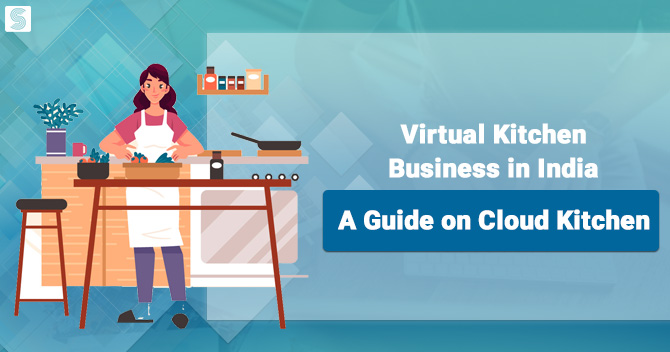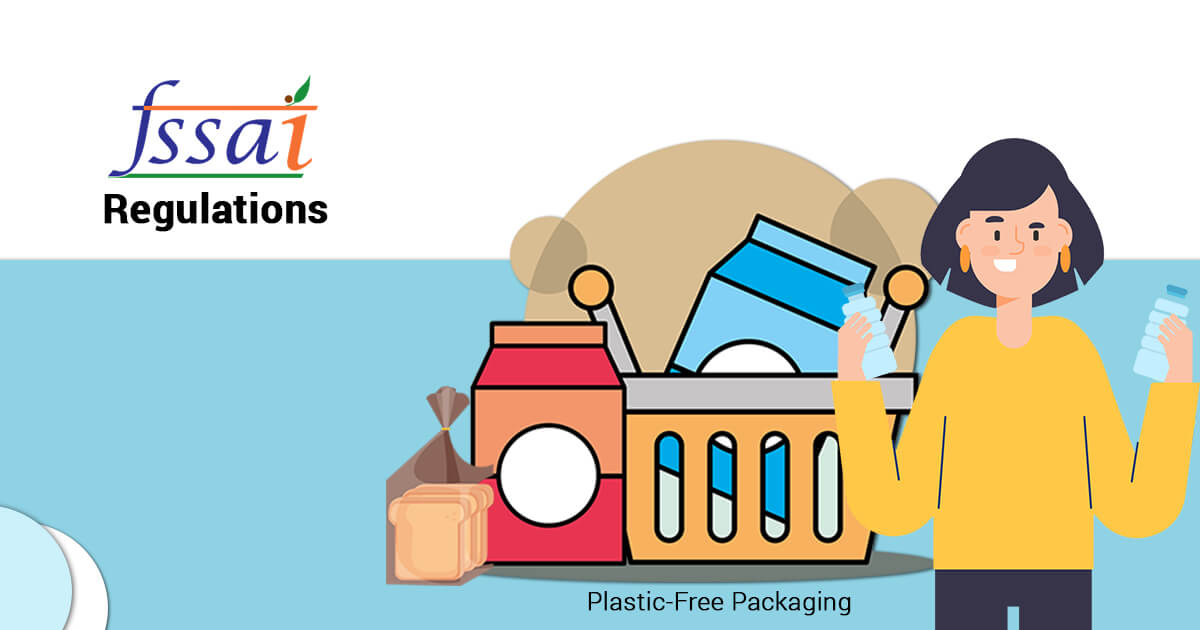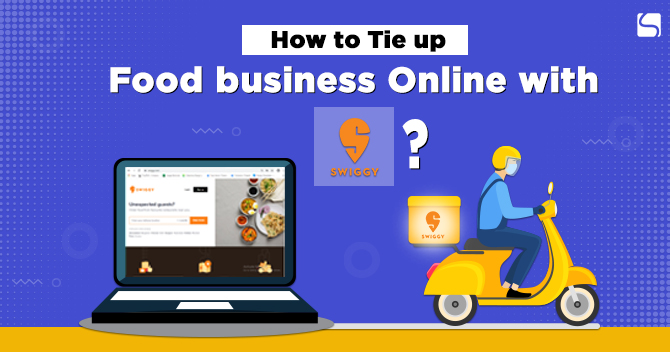Virtual Kitchen Business in India: A Guide on Cloud Kitchen

Shivani Jain | Updated: Jul 03, 2020 | Category: FSSAI
Nowadays, every restaurant business, whether new or established choose to build Cloud Kitchens. As, customers, instead of wanting to Dine in at Hotels or Restaurants, tend to prefer ordering food at home. Therefore, the ambit of Virtual Kitchen Business in India has also considerably increased.
Virtual or cloud kitchens are only food delivery platforms. These kitchens carry out the operations within the premises of a restaurant and do not have a sitting place and takeaways. Ghost or Dark Kitchens are also the names of these food delivery businesses.
In this blog, we will discuss the concept of Cloud Kitchen and what are the benefits of these kitchen spaces.
Table of Contents
What makes a Virtual Kitchen Business a Popular Food Startup in India?
Due to COVID-19 epidemic, this Food Business Model is gaining a lot of opportunities in both the Indian and International market. The reasons for the same are as follows:
- A regular Restaurant Business includes tough competition in terms of space, high rentals and escalating costs;
- Due to the norms of Social Distancing, the sales of restaurants have reduced a lot.
A Virtual Kitchen receives online food order, either through the third-party food delivery apps or on the restaurant website. These kitchens neither have the sitting space nor the takeaway facility, which indeed proves it to be a cost effective model. Therefore, a Virtual or a Cloud Kitchen needs to focus on the food quality and faster delivery to the customers.
Legal License required to start a Cloud Kitchen Business in India
In India, the legal compliances required for starting a Virtual Kitchen Business in India can be summarised as:
- FSSAI License: For starting a virtual kitchen business, it is necessary to obtain a food safety license from FSSAI. This license remains valid for a minimum of one year and a maximum of five years. The main reason to acquire this license is to ensure food quality and safety.
- GST Registration: Acquiring GST registration is compulsory for all the cloud kitchens operating in India. After registering, a GSTIN (Goods and Service Tax Identification Number) will be provided to each food vendor.
- Trade License: All the businesses operating in India needs to get a Trade License from the Municipal Office.
- Trademark Registration: A Trademark Registration will assist a food business in lifting its brand name in the market. Every business owner must apply for this registration to protect its watermark, patterns, logo, and name.
- Fire and Safety License: Normally, obtaining this license is not mandatory for a virtual kitchen operating in India. However, it is always suggested to acquire a Fire NOC for saving yourself from the future calamities.
- Eating House License: Eating House License is one of the mandatory licenses for starting a virtual kitchen business in India. Licensing Police Commissioner of the respective city is responsible for issuing this License.
- Shop and Establishment License: An owner needs to obtain Shop and Establishment License within 30 days from starting a food business. One can acquire this license either by visiting the government portal or by applying to the labour department of the state.
- Environmental Clearance Certificate: Obtaining ECC is a must for ensuring that the food business is not causing any negative or harmful impact on the environment.
Benefits of running a Virtual Food Business in India
In India, the benefits of running a virtual food business can be summarised as:
- Low capital Expenditure: A virtual kitchen deals with the concept of online ordering and delivery. It does not involve sitting space and takeaway facilities. Therefore, it incurs low capital expenditure than any other outlet in the restaurant industry.
- High-Profit Margins: A cloud kitchen includes low overhead cost in terms of electricity and water bills. Moreover, the operation with fewer people and smaller set-up tends to increase the profit margins.
- Efficient Service: A cloud kitchen involves low cost and is easy to operate. That means the owner of these kitchens can start its business in various places to serve customers effectively and quickly.
- Flexibility: The owner has the freedom to make changes in the menu as per the customer demand. In contrast, the same is not easily possible in a traditional restaurant.
- Cheap Advertising: The best marketing platform for a food business is either social media or food aggregators. Further, other cost effective channels like email marketing and SMS Marketing [1] also brings effective results for virtual kitchen business in India.
Different Types of Cloud Kitchen Business Models
In India, the different type of Cloud Kitchen Business Models can be summarised as:
- Fresh Menu Business Model: This business model is a combination of kitchen and takeaway restaurant. In this format, customers have the freedom to see their food is being prepared.
- Independent Cloud Kitchen Model: This business model is the perfect example of cloud kitchen in India. This model provides no dine-in and takeaway facility. The owners of these kitchens enter into a partnership with various online food delivery apps for their marketing.
- Swiggy Access Business Model: In the food sector, this model is known as the “Shell” Model. It is another perfect example of cloud kitchen. This model includes only the basic infrastructure like drainage facilities, ventilation and gas pipelines. Swiggy [2] is the ruling authority of this model. It rents out space for kitchens and uses its marketing strategies to attract customers.
- Zomato Kitchen Business Model: In this model, Zomato works with a few selected restaurant partners. Through this model, zomato assists the small restaurants in expanding their business to more locations with minimal fixed costs.
- Faasos or Rebel Food Business Model: The approach of this model is different from others. In this one single commercial kitchen will provide cuisines of various brands. This model works on the principles of Data Intelligence, such as cuisine demand, supply, consumer preferences, etc.
Latest updates on Virtual Kitchen Business in India
The latest updates on Virtual Kitchen Business in India are as follows:
- The Indian government had allowed the restaurants to start functioning since 08.06.2020. However, the restaurants are not allowed to operate in full capacity. Therefore, to solve this issue, many restaurants started working on the Virtual Kitchen Model.
- Rebel foods would expand its functions by manufacturing those products which the consumer at home needs. Further, Rebel Foods operates with Oven Story, Behrouz, Faasos, and Firangi Bake.
- In India, the Online Food Delivery Market is expected to reach the following figures by 2024:
- CAGR (Compound Annual Growth Rate) of 30.55 % ( Revenue Based);
- 10.9 % ( on the basis of the number of users);
- Revenue up to Rs 1334.99 Billion;
- User Base up to Rs 300.7 Million.
Conclusion
Nowadays, the size of the food does not matter, as customers are only concerned about the ease and the food quality. Therefore, starting a Virtual Kitchen Business in India is a perfect choice for the budding food business owners. This format not only guarantees you high-profit margins but also involves less capital, fixed and marketing cost. Further, as per the recent report, India is expected to become a hub for online food market by the year 2024. Moreover, due to COVID-19 epidemic [3] , restaurants have started converting themselves into a virtual or cloud Kitchen. At Swarit Advisors, our team of experts would assist as well as guide in obtaining all the mandatory permits. The mandatory permit includes FSSAI license, GST Registration, and Eating House License, etc.
More on FSSAI:Kerala FSSAI Registration and License














